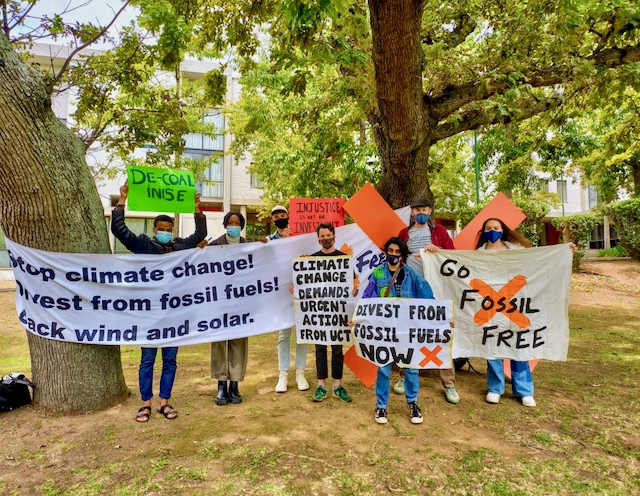Call for UCT to urgently divest from fossil fuels
Decision to be made at next UCT Council meeting on 4 December
Representatives of Fossil Free UCT and UCT Green Campus Initiative are urging the UCT Council to vote in favour of phasing out all university investments in fossil fuels at its upcoming Council meeting on Saturday. Photo: Marecia Damons
- Fossil Free UCT and UCT Green Campus Initiative held a picket and penned an open letter urging the University of Cape Town to divest from fossil fuels.
- The matter is set to be decided at the next council meeting on Saturday 4 December.
- UCT’s University Panel for Responsible Investment has recommended it divest.
“In the grand scheme of things the decision you make on 4 December is not just about you. It is about your children, your students’ futures, and the lives of millions of young people across the country who deserve a chance at life within a reasonably stable environment,” Fossil Free UCT and UCT Green Campus Initiative have told the University of Cape Town (UCT) in an open letter.
They want UCT to commit to divesting from fossil fuels at the upcoming council meeting on 4 December.
In the letter addressed to the UCT Council, the groups urged it to fully adopt the fossil fuel divestment recommendation from the UCT University Panel for Responsible Investment (UPRI).
South Africa emitted over 450 million metric tons of carbon dioxide in 2020, making it the largest emitter in Africa and the 13th largest in the world by country.
For the past eight years, the Fossil Free UCT campaign has tried to persuade UCT to phase out all its investments in coal, oil and gas.
Together with academics, students, Cape Town school learners and NGOs, they have written to the UCT Council and launched several petitions in this regard.
In December 2020, the UCT Convocation voted in favour of divestment, and the UPRI published its recommendations in August 2021, advising the UCT Foundation and Council to commit to fully divesting from fossil fuels by 31 December 2029 or earlier.
The Council was asked to recommend to its Trustees and the Joint Investment Committee (JIC) that its fund managers be instructed to seek investment opportunities in the renewable energy sector or in investment projects that enable a just energy transition, through, for example, promoting diversification of economic opportunities in communities and regions that are currently most dependent on fossil-fuel industries.
The panel also recommended that the Council consider a Responsible Investment Office for UCT.
David Le Page, of Fossil Free SA, said that if the UCT Council decides to not divest it would be ignoring the research of its own experts.
“If UCT doesn’t divest, it will be showing itself to be a laggard on human rights, on climate and social justice issues … it would put the university’s endowment at risk of financial losses from stranded assets, carbon bubble risk, and lost opportunities to invest in a just energy transition.
“It would be a terrible betrayal of the students whose futures UCT should be safeguarding,” said Le Page.
On Thursday, representatives of UCT Green Campus Initiative demonstrated at the Graca Lawns.
“For an institution like UCT to continue its investments in fossil fuels is no longer morally, socially or economically viable especially in the climate crises we find ourselves in,” said James Granelli of the Initiative.
Raeesah Noor-Mahomed, from the Climate Justice Charter Movement, said, “To still be invested in fossil fuels, is to be making money at the expense of the most marginalised people.”
Le Page said they are hopeful that the Council will adopt the UPRI’s full recommendation. Representatives of the organisations had spoken to the chair of the UCT Council Babalwa Ngonyama on Wednesday evening.
The UCT Council has yet to respond to our questions.
Support independent journalism
Donate using Payfast

Don't miss out on the latest news
We respect your privacy, and promise we won't spam you.
© 2021 GroundUp. This article is licensed under a Creative Commons Attribution-NoDerivatives 4.0 International License.
You may republish this article, so long as you credit the authors and GroundUp, and do not change the text. Please include a link back to the original article.
We put an invisible pixel in the article so that we can count traffic to republishers. All analytics tools are solely on our servers. We do not give our logs to any third party. Logs are deleted after two weeks. We do not use any IP address identifying information except to count regional traffic. We are solely interested in counting hits, not tracking users. If you republish, please do not delete the invisible pixel.

